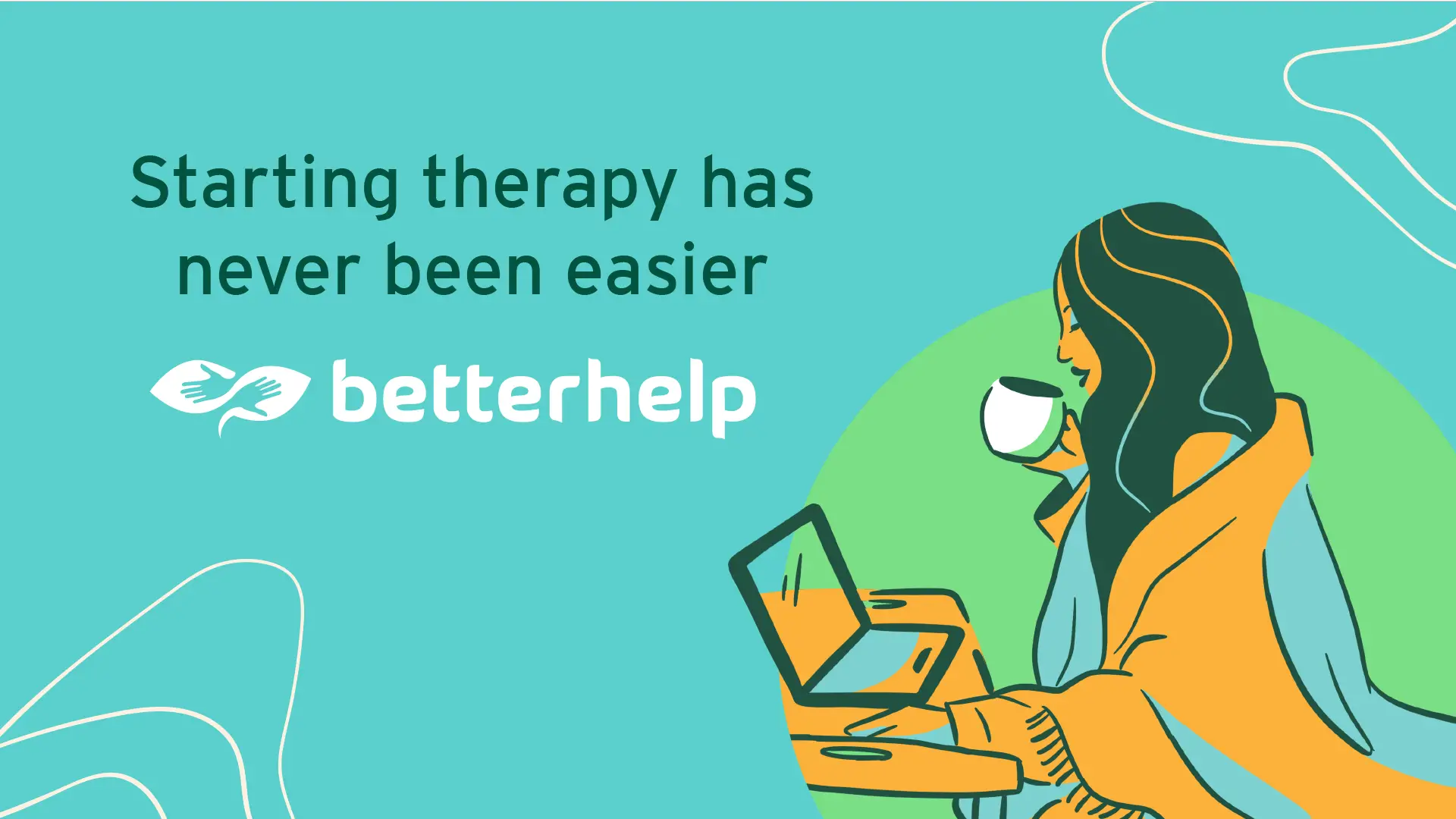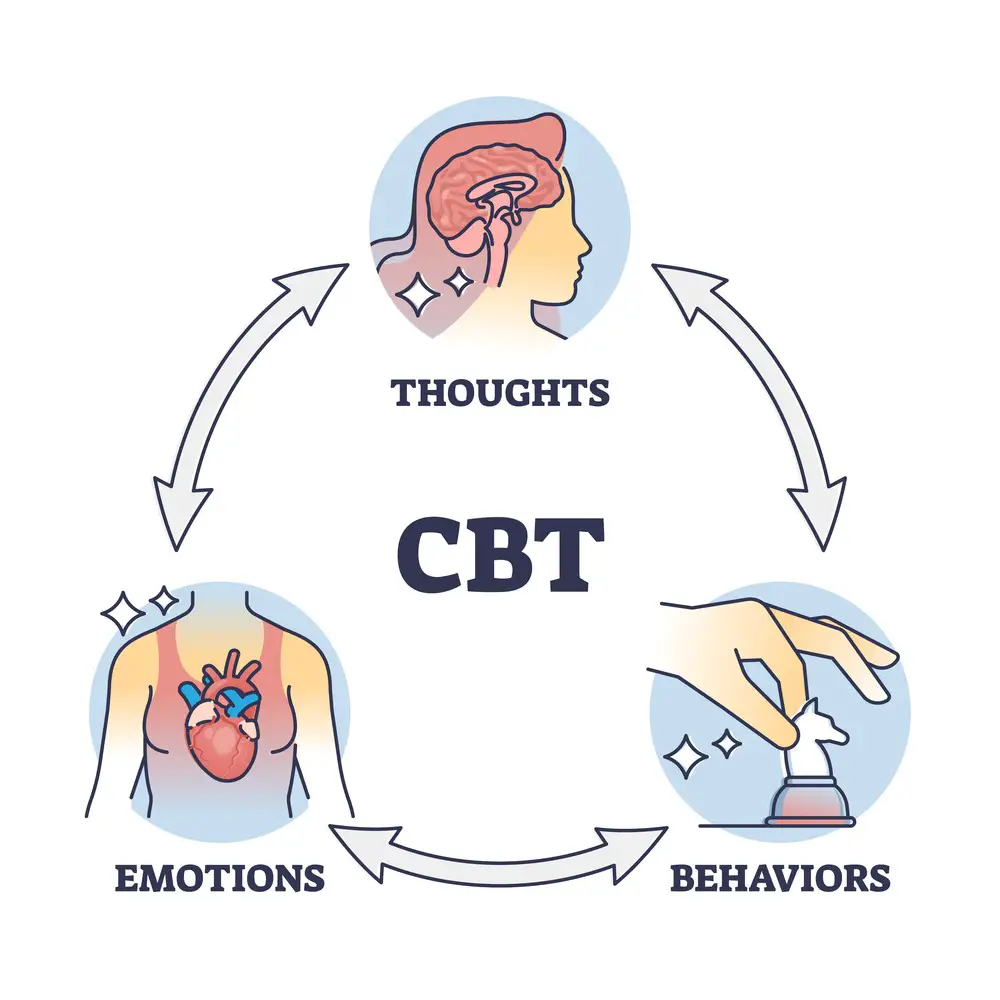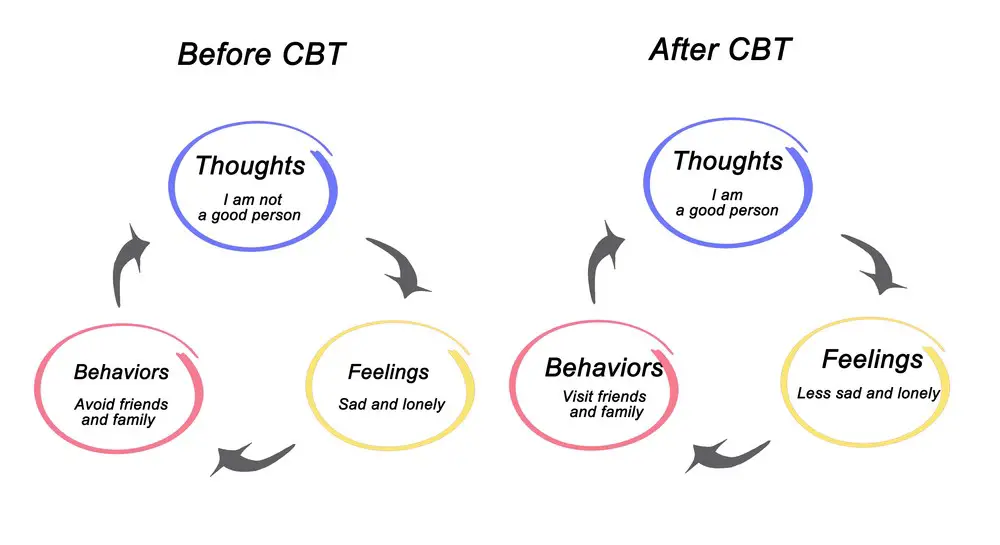As a BetterHelp affiliate, we receive compensation from BetterHelp if you purchase products or services through the links provided
• Learn about the differences between CBT and psychotherapy
• Get an unbiased perspective on the two approaches
• Make an informed decision about which type of therapy is best for you
• Gain insight into how each therapy works
• Understand the benefits of each approach
Choosing the right therapy to address your anxiety or insomnia can be difficult. Cognitive behavioral therapy (CBT) and psychotherapy are the most popular therapies for addressing mental health issues such as stress, depression, and other psychological conditions. But what’s the difference between CBT vs. psychotherapy? In this blog post, we’ll explore these differences in depth so you can decide which type of therapy best suits your needs. We’ll cover topics like how each approach works, choosing between them, finding a therapist that fits with you, and cost comparisons, all from an informative perspective without bias towards either approach. So if you’re looking for information on cognitive behavioral therapy vs. psychotherapy, look no further!
Table of Contents:
Cognitive Behavioral Therapy (CBT)
Definition: Cognitive Behavioral Therapy (CBT) is a type of psychotherapy that focuses on identifying and changing negative thought patterns and behaviors to reduce symptoms of anxiety and insomnia. It is based on the idea that our thoughts, feelings, and behaviors are all interconnected, so by altering one aspect, we can affect others. CBT is effective for many mental health issues, such as depression, phobias, eating disorders, substance abuse problems, post-traumatic stress disorder (PTSD), obsessive-compulsive disorder (OCD), anger management issues, and relationship difficulties.
Benefits: CBT helps people become aware of their distorted thinking patterns, which can lead to unhealthy behavior or emotions. By recognizing these patterns, they can challenge them with evidence from reality instead of letting them control their lives. This process helps individuals gain insight into how their beliefs shape their reactions to situations which allows them to make changes to manage stressors or difficult emotions better. Additionally, it encourages self-reflection so people can learn how to respond differently when facing similar future challenges.
CBT is an effective form of therapy that can help people with anxiety and insomnia manage their symptoms. Psychotherapy is another popular approach to addressing mental health issues, which will be discussed in the next section.
Psychotherapy
Psychotherapy, also known as talk therapy, is a form of treatment that involves talking with a mental health professional to address emotional issues or mental health concerns. It can help people learn how to manage their emotions and behaviors to lead healthier lives.
Definition: Psychotherapy is an evidence-based practice that uses psychological techniques such as cognitive behavioral therapy (CBT), interpersonal psychotherapy (IPT), and dialectical behavior therapy (DBT) to help individuals identify and work through underlying issues causing distress. Psychotherapy aims to provide insight into the individual’s thoughts, feelings, and behaviors to make positive changes in their life.
There are many benefits associated with psychotherapy, including improved self-esteem, better communication skills, increased coping strategies for stress management, enhanced problem-solving abilities, improved relationships with others, reduced symptoms of depression or anxiety disorders and decreased risk of substance abuse relapse prevention strategies. Additionally, it can be used as a preventative measure against future episodes of mental illness by providing tools for managing stressors before they become overwhelming.
Psychotherapy is a valuable tool for addressing anxiety and insomnia, as it can help individuals identify patterns of behavior contributing to their distress. In the next section, we will compare cognitive behavioral therapy and psychotherapy to understand how they differ.
Comparison of CBT and Psychotherapy
Cognitive Behavioral Therapy (CBT) and psychotherapy are two different approaches to treating mental health issues such as anxiety and insomnia. While both have been proven effective in helping people manage their symptoms, some critical differences between them should be considered when deciding which approach is best for an individual.
Similarities and Differences
CBT and psychotherapy involve talking with a therapist about one’s thoughts, feelings, behaviors, and relationships. However, they differ in how they view the cause of psychological distress. CBT focuses on identifying patterns of thinking or behavior that contribute to emotional problems. At the same time, psychotherapy takes a more holistic approach by exploring underlying issues, such as past experiences or family dynamics, that may contribute to current difficulties. CBT focuses on problem-solving strategies, whereas psychotherapy often involves gaining insight into oneself through self-reflection.
Pros and Cons of Each Approach
The main benefit of CBT is its structured nature; it can help individuals quickly identify problematic thought patterns or behaviors so they can start working towards solutions immediately. On the other hand, many find psychotherapy helpful because it allows them time to explore their emotions without feeling rushed or judged by their therapist. It also encourages a deeper understanding of oneself, leading to lasting change. The downside is that it may take longer than CBT before tangible results become apparent since progress depends heavily on how willing someone is to engage in self-exploration during sessions with their therapist.
Both cognitive behavioral therapy and psychotherapy offer different approaches to managing stress, anxiety, and insomnia. As you consider which is right for you, take the time to evaluate your needs and understand the differences between these two therapies.
How to Choose the Right Therapy for You?
Choosing the right therapy for you can be a daunting task. Finding one that works best for your individual needs and lifestyle is essential. There are several considerations when choosing the right therapy, such as the type of therapy, duration of treatment, cost, and therapist qualifications.
Considerations for Choosing the Right Therapy for You:
When considering which type of therapy best suits your needs, it is essential to understand what each type offers in terms of techniques and approaches used. Cognitive Behavioral Therapy (CBT) focuses on identifying negative thought patterns and behaviors that contribute to anxiety or insomnia and replacing them with more positive ones. Psychotherapy involves talking through issues with a trained professional to gain insight into underlying causes or triggers of stress or distress.
Questions to Ask Yourself Before Making a Decision:
Before deciding which type of therapy may be most beneficial, it’s essential to ask yourself some questions about your goals from treatment, how much time you have available for appointments if there are any financial constraints involved in seeking help, etcetera. Additionally, consider whether you prefer an individual approach or group setting and if any particular therapists specialize in treating conditions like yours that could provide better results than others might offer.
Finding the right therapist should involve researching their credentials and experience before committing. Research potential providers before scheduling an appointment; this will ensure you decide which therapist best suits your individual needs.
Choosing the right therapy for you is essential in managing your anxiety or insomnia. Once you have considered all your options and asked yourself the vital questions, it’s time to find a therapist who can help you on your journey toward healing.
Finding the Right Therapist for You?
Finding someone with the qualifications and experience necessary to provide effective treatment is essential when looking for a therapist. Qualifications to look for in a therapist include:
• A license or certification from an accredited organization such as the American Psychological Association (APA) or National Board of Certified Counselors (NBCC). This ensures that your therapist has met specific standards of education and training.
• Experience working with people who have similar issues as you. It is essential to find a therapist who understands your specific needs and can help you work through them effectively.
• An understanding of evidence-based treatments such as cognitive behavioral therapy (CBT), which has been proven effective in treating anxiety and insomnia.
In addition to looking at qualifications, it’s also important to ask questions during an initial consultation to better understand whether this particular therapist is right for you. Questions may include:
• What are your areas of expertise?
• How do you approach treatment?
• Do you use any specific techniques or approaches?
• How long will treatment typically last?
• Are there any additional resources available outside of sessions that I could take advantage of?
Asking these questions will give you more insight into how the therapy process works, what kind of support the therapist provides, and how they might be able to help address your individual needs. Ultimately, finding the right therapist is essential for therapy sessions to be successful; taking time during an initial consultation can help ensure that this happens.
When finding the right therapist for you, taking the time to research their qualifications and ask questions during an initial consultation can make all the difference. Now let’s look at the cost of CBT vs. psychotherapy and how insurance coverage affects out-of-pocket costs.
Cost of CBT vs. Psychotherapy
The cost of cognitive behavioral therapy (CBT) and psychotherapy can vary depending on insurance coverage and out-of-pocket costs. Insurance companies typically cover a portion of the cost for both types of treatment, but there are still some expenses that the patient must pay.
Insurance Coverage and Out-of-Pocket Costs: Most health insurance plans will cover at least part of the cost of CBT or psychotherapy sessions. The amount covered depends on the type of plan you have as well as your deductible and co-pay amounts. It’s essential to check with your insurer before beginning any therapy to make sure you understand what is covered and what isn’t. You may need to pay out-of-pocket for these services if your plan does not cover all or part of the cost.
Out-of-pocket costs include copays, coinsurance payments, deductibles, fees for missed appointments or cancellations without proper notice, etc. Depending on where you live, it is possible to find therapists who offer sliding scale fees based on income level so that people with limited resources can still access care if needed. It’s also worth noting that many mental health professionals accept payment via credit card or other forms of electronic payment in addition to cash or check payments which may be more convenient than traditional methods in some cases.
When considering whether CBT or psychotherapy is suitable for you, it is essential to factor in potential financial obligations associated with each option so that you can make an informed decision about how best to proceed with the treatment options available to you.
Understanding the costs associated with cognitive behavioral therapy and psychotherapy is essential, as this can be a significant factor in deciding which treatment is right for you. Next, we will explore resources that can help provide more information about CBT vs. Psychotherapy.
Resources for Further Information on CBT vs. Psychotherapy
Many resources are available when researching the differences between cognitive behavioral therapy (CBT) and psychotherapy. Books can provide a comprehensive overview of both therapies and their similarities and differences. Popular books on CBT include “The Cognitive Behavioral Workbook for Anxiety” by William J. Knaus, EdD, and “The Feeling Good Handbook” by David D Burns, MD. Popular books on psychotherapy include “Psychodynamic Psychotherapy: A Clinical Manual” by Robert J Ursano MD, Ph.D., ABPP, and “Psychoanalytic Diagnosis: Understanding Personality Structure in the Clinical Process” by Nancy McWilliams Ph.D.
Websites can also be a great source of information about CBT versus psychotherapy. The American Psychological Association website provides an overview of both therapies and links to additional resources, such as articles written by experts in the field. The National Institute of Mental Health website offers detailed descriptions of each type of therapy and helpful tips for finding a therapist specializing in one or both treatment approaches.
Ultimately, choosing which type best suits your needs should involve careful consideration based on your situation. Therefore, consulting with a qualified professional is always recommended before making any decisions regarding treatment plans.
FAQs
What is the difference between cognitive behavioral therapy and psychotherapy?
Cognitive Behavioral Therapy (CBT) is a type of psychotherapy that focuses on identifying and changing negative thought patterns to modify behavior. It helps individuals recognize how their thoughts, feelings, and behaviors are connected and teach them skills to manage difficult situations. CBT often treats anxiety disorders, depression, phobias, eating disorders, substance abuse, and insomnia.
Psychotherapy is a broader term for any therapy that seeks to help individuals better understand their emotions or behaviors to improve mental health. This could include talk therapy, such as cognitive behavioral therapy and other forms, such as art therapy or music therapy which focus on using creative outlets to express oneself and understand one’s emotions better.
Which is better, psychotherapy or CBT?
It is difficult to definitively answer which type of therapy is better for anxiety or insomnia, as it depends on the individual’s needs and preferences. Psychotherapy can help individuals gain insight into their emotions and behaviors, while Cognitive Behavioral Therapy (CBT) focuses on identifying and changing unhelpful thoughts and patterns of behavior. Both approaches are effective in treating anxiety and insomnia, so it may be best to consult with a mental health professional who can assess your situation before deciding which type of therapy would work best for you.
Is cognitive behavioral therapy a type of psychotherapy?
Yes, cognitive behavioral therapy (CBT) is a type of psychotherapy. It focuses on identifying and changing negative thought patterns and behaviors to improve mental health. CBT treats various conditions, such as anxiety, depression, phobias, eating disorders, insomnia, and more. It typically involves talking with a therapist in individual or group sessions over several weeks or months.
Is CBT the most effective form of psychotherapy?
CBT (Cognitive Behavioral Therapy) is a form of psychotherapy that effectively treats many mental health issues, including anxiety and insomnia. It focuses on identifying negative thought patterns and behaviors, then working to replace them with more positive ones. Research has shown that CBT can be an effective treatment for many psychological disorders, making it one of the most popular forms of psychotherapy today. While other therapies may have advantages, CBT appears to be the most widely accepted and successful form of psychotherapy.
Conclusion
When it comes to cognitive behavioral therapy vs psychotherapy, deciding which is right for you will depend on your individual needs and preferences. Ultimately, both therapies can be effective in helping individuals manage their anxiety or insomnia. It is essential to take the time to research and understand each approach before making a decision. Finding the right therapist specializing in either CBT or psychotherapy can also help ensure you get the most out of your treatment. With proper guidance and support, these therapies can provide invaluable tools for managing stress and improving overall well-being.
Are you feeling overwhelmed and struggling to cope with life’s daily challenges? If so, consider seeking help from a professional therapist. Cognitive Behavioral Therapy (CBT) and Psychotherapy can provide the guidance needed to develop coping skills, gain insight into behaviors, reduce stress levels, improve relationships, and make positive changes in your life. Don’t wait any longer – take action today for long-term solutions!

- 7 Ideas to Help You Relax and Unwind on a Family Vacation - April 27, 2025
- How Having Cybersecurity Protection Helps You Relax - April 25, 2025
- 8 Reasons Why Spending Time Outside Calms You Down - April 25, 2025
This site contains affiliate links to products. We will receive a commission for purchases made through these links.






